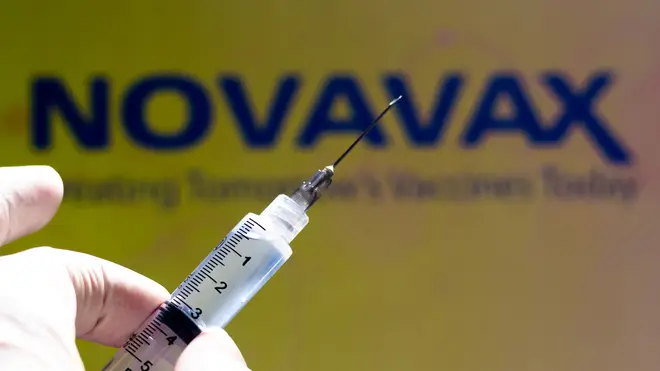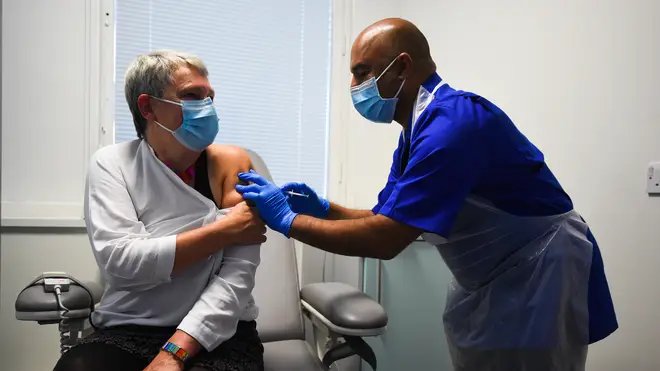
Paul Brand 7am - 10am
29 January 2021, 10:27 | Updated: 29 January 2021, 13:25

Final trials have shown the Novavax vaccine is highly effective against Covid-19 - but what are the efficacy rates? What type of vaccine is it? And what's the storage temperature? Here's the latest information on the new jab including where it was made.
The lasted Covid jab Novavax, following the AstraZeneca and Pfizer vaccines, could be allowed within weeks in the UK as late-stage trials suggested it was effective in preventing multiple coronavirus variants.
Over 15,000 participants between 18 and 84 were studied in Phase 3 clinical trials, of which 27% were older than 65.
Prime Minister Boris Johnson thanked volunteers who made the results possible and confirmed it is now ready to be assessed by the vaccines regulator.
Taking a closer look at the new Novavax vaccine, here's the efficacy rate, what type of vaccine it is and where it was made:

Before it can be distributed, the drug needs approval from the Medicines and Healthcare products Regulatory Agency (MHRA).
While there is no official timeline, it is expected to take several weeks for the regulator to assess the data sent by Novavax and for it to be signed off or rejected.
Health Secretary Matt Hancock said the NHS stands ready to roll out the vaccine if it is approved, which he said would provide a "significant boost to our vaccination programme and another weapon in our arsenal to beat this awful virus".
The Novavax jab would be delivered in the second half of 2021 if it receives MHRA approval.
Two vaccines have already been rolled out in the UK - from Pfizer/BioNTech and Oxford/AstraZeneca - while a third from Moderna has also been approved for use.
The jab has shown a significant 86% effectiveness against the Kent variant of the virus and around 60% effectiveness against the South African variant.
The chairman of the Government's Vaccine Taskforce, Clive Dix, said the results were "spectacular", adding: "The efficacy shown against the emerging variants is also extremely encouraging.
"This is an incredible achievement that will ensure we can protect individuals in the UK and the rest of the world from this virus."
England's Chief Medical Officer, Profession Chris Whitty, said it was a "highly effective vaccine to add to the medical countermeasures" against the virus.
Boris Johnson has confirmed the UK vaccine will be made in the North East of England in Teesside.
Good news that the @Novavax vaccine has proved effective in UK trials. Thank you to all the volunteers who made these results possible.
— Boris Johnson (@BorisJohnson) January 28, 2021
Our medicines regulator will now assess the vaccine, which will be made in Teesside. If approved, we have 60m doses on order.
The potential new coronavirus vaccine only needs to be stored at fridge temperature like the AstraZeneca and Moderna vaccines.
This makes distribution and storage much easier than the Pfizer vaccine which needs to stay at -70 temperatures.
The country has secured 60 million Novavax doses which is believed to offer protection against the new UK and South African variants.
It was shown to be 89.3% effective at preventing coronavirus in participants in its Phase 3 clinical trial in the UK, which involved more than 15,000 people aged between 18-84, of which 27% were older than 65, Novavax said.
The vaccine will now be assessed by the Medicines and Healthcare products Regulatory Agency (MHRA), Prime Minister Boris Johnson confirmed, as he thanked volunteers who made the results possible.
The drug is a protein adjuvant. An adjuvant is added to some vaccines to enhance the immune response and has been shown to create stronger and longer-lasting immunity against infections than the vaccine alone.
The use of an adjuvant may reduce the amount of protein required per dose, which allows more doses to be produced.